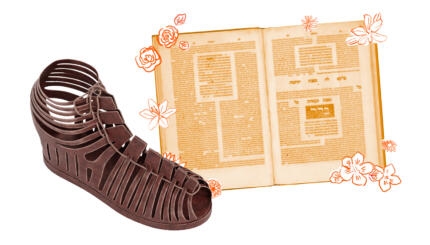We paid with silver to drink our own water; our own wood was acquired at an exorbitant price (Lamentations 5:4).
With these words, the poet-composer of the Book of Lamentations describes the dire conditions in Jerusalem as the city was destroyed by the Babylonians in 586 BCE. On today’s daf, the rabbis apply a midrashic reading to recast this verse as a description of an experience of their own, relating that just as necessities are expensive during a time of crises, Torah can also come at a price when things get rough:
During the time of danger, a halakhic ruling was requested: If she (a minor) left her first husband by means of a bill of divorce and her second by refusal, what is the halakhah with regard to her returning to the first?
They hired a person for four hundred dinars to ask Rabbi Akiva, who was in prison, and he ruled that it is forbidden.
With your help, My Jewish Learning can provide endless opportunities for learning, connection and discovery.
During a time of oppression, when the Roman Empire had banned the study of Torah, a legal question arose. A messenger was hired to find out how Rabbi Akiva, jailed for teaching Torah, would rule. Due to the danger involved, the messenger was paid a significant fee.
The rabbis see this story as a fulfillment of the verse in Lamentations. Water is often used by the rabbis as a metaphor for Torah. So too wood (in Hebrew, eitz, which can also mean tree), as in the famous verse from Proverbs 3:18: “It is a tree of life to those who hold fast to it.”
Eitz also shares many letters with the word eitza, which means advice. With these images in mind, the rabbis understand the verse from Lamentations to be saying: “They paid with silver to learn from their own Torah; an exorbitant price to get the advice of their teacher.”
This story about Rabbi Akiva teaching Torah from prison calls to mind that of Rabbi Ephraim Oshry, the rabbi of the Kovno ghetto in Lithuania. During the Holocaust, Oshry was asked about how to live Jewishly under the most difficult of situations: Can you use a cracked shofar on Rosh Hashanah if it is the only one that you have? How can you fulfill the obligation to drink four cups of wine on Pesach in the ghetto? Can you pretend to be a non-Jew to save your own life? Can you save yourself if your actions will lead to the death of a fellow Jew?
During the war, Oshry recorded his responses to these and other questions and buried them in the hope they would be found one day. Unlike Rabbi Akiva, who according to the Talmud was executed by the Romans, Rabbi Oshry survived. After the war, he went back to the ghetto and found much of what he had written, which he published over time.
The rabbis saw Torah as a necessity, just like water and firewood, a life-sustaining force that saw them through good times and bad. Today’s daf calls forward the memory of how the Jewish people turned to Torah during the darkest of times in history — the destruction of the Temple, Roman persecutions, and the Holocaust. In our generation too, in the face of its own troubles, the Torah is a tree of life for those who hold fast to it.
Read all of Yevamot 108 on Sefaria.
This piece originally appeared in a My Jewish Learning Daf Yomi email newsletter sent on June 23th, 2022. If you are interested in receiving the newsletter, sign up here.



